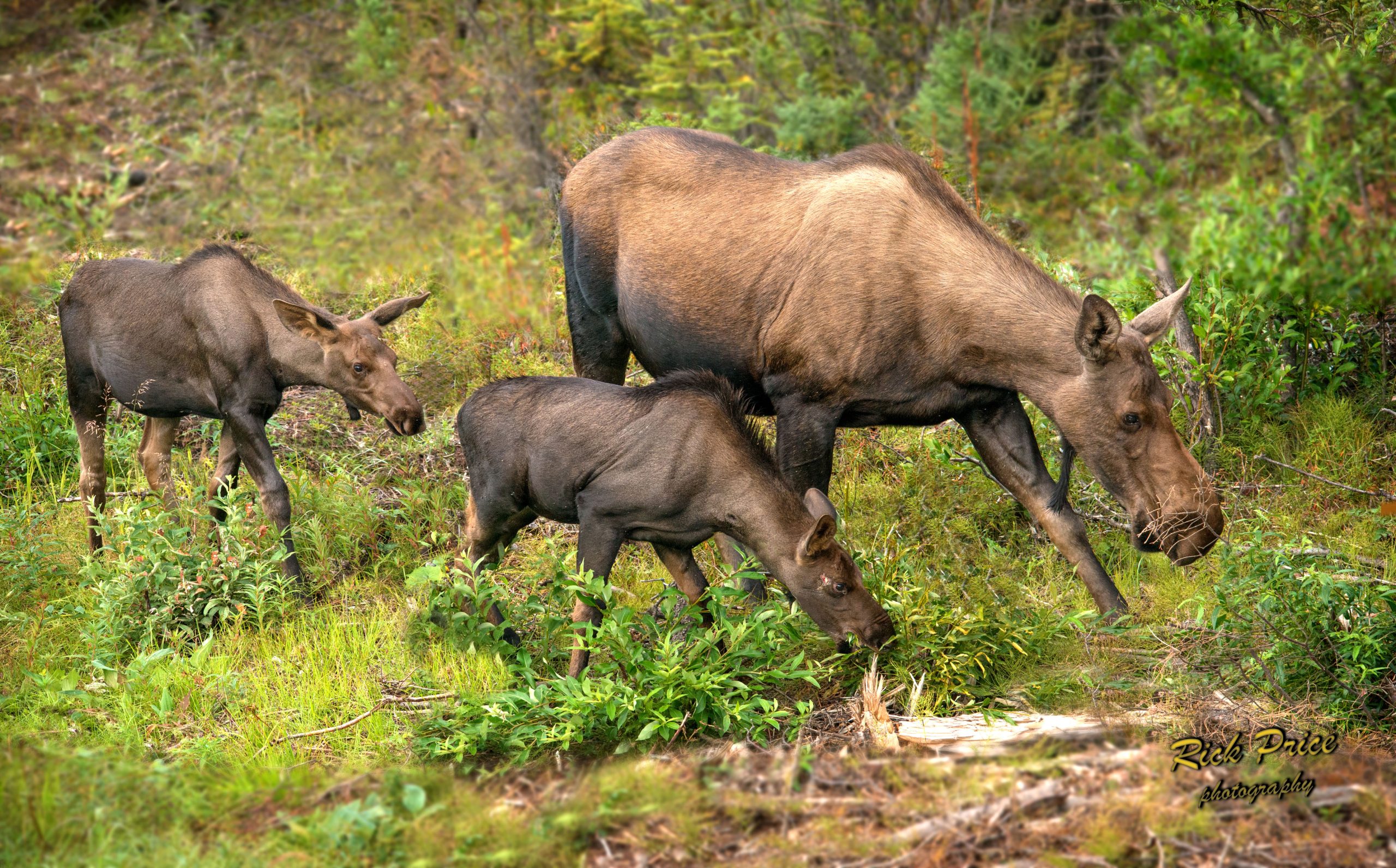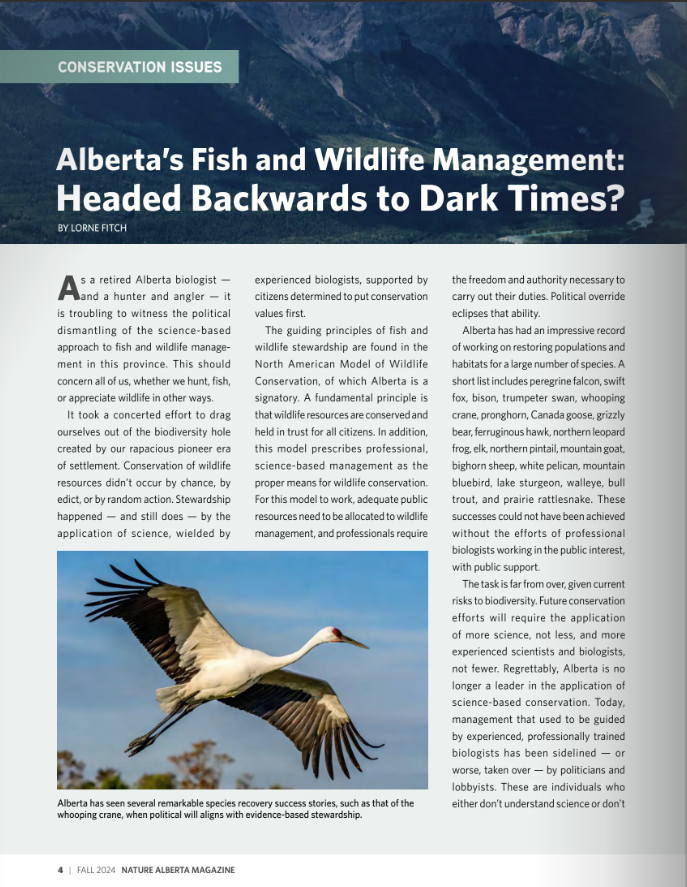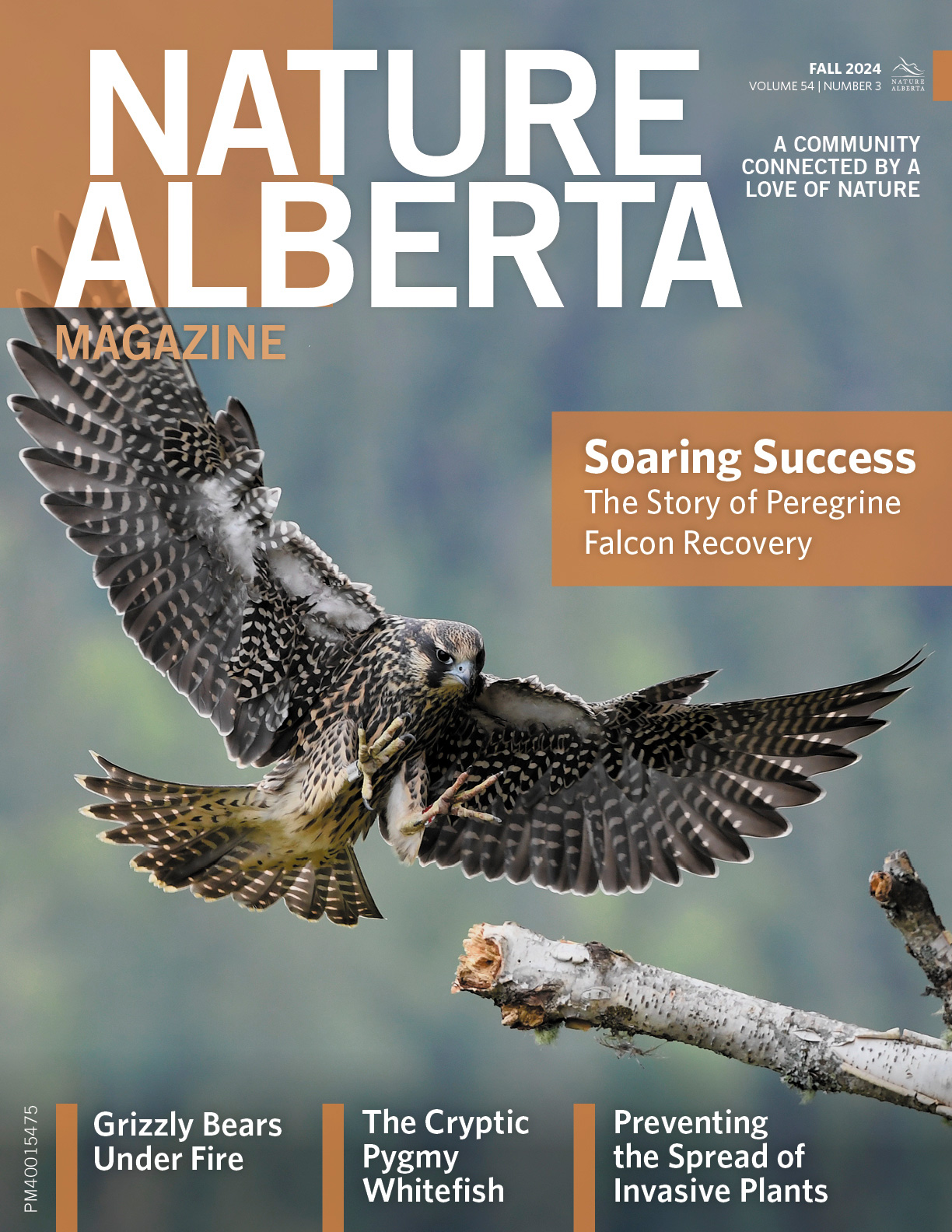Alberta’s Fish and Wildlife Management: Headed Backwards to Dark Times?
18 October 2024

By LORNE FITCH
As a retired Alberta biologist — and a hunter and angler — it is troubling to witness the political dismantling of the science-based approach to fish and wildlife management in this province. This should concern all of us, whether we hunt, fish, or appreciate wildlife in other ways.
It took a concerted effort to drag ourselves out of the biodiversity hole created by our rapacious pioneer era of settlement. Conservation of wildlife resources didn’t occur by chance, by edict, or by random action. Stewardship happened — and still does — by the application of science, wielded by experienced biologists, supported by citizens determined to put conservation values first.
The guiding principles of fish and wildlife stewardship are found in the North American Model of Wildlife Conservation, of which Alberta is a signatory. A fundamental principle is that wildlife resources are conserved and held in trust for all citizens. In addition, this model prescribes professional, science-based management as the proper means for wildlife conservation. For this model to work, adequate public resources need to be allocated to wildlife management and professionals require the freedom and authority necessary to carry out their duties. Political override eclipses that ability.
Alberta has had an impressive record of working on restoring populations and habitats for a large number of species. A short list includes peregrine falcon, swift fox, bison, trumpeter swan, whooping crane, pronghorn, Canada goose, grizzly bear, ferruginous hawk, northern leopard frog, elk, northern pintail, mountain goat, bighorn sheep, white pelican, mountain bluebird, lake sturgeon, walleye, bull trout, and prairie rattlesnake. These successes could not have been achieved without the efforts of professional biologists working in the public interest, with public support.
The task is far from over, given current risks to biodiversity. Future conservation efforts will require the application of more science, not less, and more experienced scientists and biologists, not fewer. Regrettably, Alberta is no longer a leader in the application of science-based conservation. Today, management that used to be guided by experienced, professionally trained biologists has been sidelined — or worse, taken over — by politicians and lobbyists. These are individuals who either don’t understand science or don’t want to, who don’t trust biologists and the data they produce, or who have a vested economic interest in pursuing their own agenda. The evidence for this is expressed with the following examples:
- In Alberta, grizzly bears are a Threatened species. Despite this, in a politically directed administrative sleight of hand, a hunt was initiated under the contrived guise of protecting public safety and property (see the article on page XX). Hunters, selected by draw and disconnected from bear conservation plans, are to provide a rapid response to “problem bears” and will be able to keep the carcass. Grizzly bear experts are unanimous that sport hunting, contrary to assertions, will not minimize depredations against private property or human/bear conflicts.
- Cougar hunting is managed based on strict regional quotas. This is a tightly regulated hunt, based on years of study. Near the end of a recent season, there was political intervention to increase the quotas, even for female cats, and open up new areas to hunting, including a provincial park. All this was contrary to the management plan and was a wild deviation from scientific objectives.
- Quotas for mule deer, mountain goat, and moose hunting have also been manipulated to appease special interests. This is inconsistent with the way quotas should be derived: from evidence-based decision-making based on aerial surveys.
- Years of patient, evidence-based recovery of lake-dwelling sport fish were nearly derailed by a politically motivated attempt to throw open harvest levels, the approach that had caused these populations to crash in the first place.
- Despite no solid evidence that cormorant control measures work to protect game fish populations, a politically inspired cormorant season was opened, under the shield of a “damage control licence.”
- Other changes have been mused about, including night hunting for predators and hunts for mourning doves and whistling swans. A retired colleague of mine calls the rationale behind these “light on fact, heavy on political pressure.”
Hunters, conservationists, and biologists are concerned that recent changes in wildlife management are more about supporting business interests than about conservation in the broad public interest. The scenario currently playing out is a serious deviation from publicly supported, science-informed, and professionally guided management practices. These are the tactics being employed:
- Undermine and slash budgets and staffing, making professional biologists and their actions seem ineffective.
- Separate functions, including allocation, research, enforcement, education, and wildlife coexistence, into different departments with unrelated mandates. Then discourage collaboration and co-operation between biological staff now working in separate departments.
- Hinder communication with the public by gagging and isolating biologists from public engagement. In addition, refuse to share or delay the sharing of publicly funded data and reports when the information happens to be contrary to the chosen political narrative.
- Enforce a top-down, authoritarian decision-making process in which ideas are to be blindly implemented and then defended.
- Punish any staff expressing objective concerns, displaying independent thinking, or proposing alternate approaches. Also, facilitate early retirement or resignation of committed biologists by frustrating their efforts, and then fail to replace them.
- Promote public mistrust in professional biological staff by treating them as political servants instead of knowledgeable advisors.
- Deny or ignore scientific evidence in favour of advice by would-be experts with vested interests.
- Weaken the concept that fish and wildlife are a public resource to be stewarded and instead treat them as commodities, like oil, gas, and timber, to be exploited for financial gain by special economic interest groups.
- Narrow the focus of management to “game” species while undercutting work on species at risk and critical habitat conservation.
What we are now seeing is a full-blown contagion of political meddling in fish and wildlife management. This never ends well. There are hard limits to what nature can provide, which means we can’t always have what we want. The collapsed Newfoundland cod fishery is the poster child for what happens when politics intrude into resource management. Closer to home, the failure to listen to expert advice on game ranching has resulted in chronic wasting disease crippling wild ungulate populations and wild boars running rampant. Failure to believe the data on caribou, native trout, and sage grouse declines has stymied recovery efforts. The bottom line is that gut instincts, intuition, personal whims, crowd-think, social media opinion, and political favouritism are poor substitutes for evidence-based decision-making.
There is public support for science-based stewardship of our wild heritage because it serves the majority of Albertans. Politically driven decisions that benefit only a few is retrogressive, taking us back to dark times for wildlife. When the public is excluded and biologists are not allowed to employ their professional responsibilities (and ethics) due to political interference, we run the risk of progressive declines in Alberta’s wildlife.
Everyone — hunters, anglers, and naturalists — benefits when we steward fish and wildlife using science and facts applied in a professional manner and refined through a balanced, fair, and open public process. When we don’t, stewardship fails, and we all lose.
Lorne Fitch is a Professional Biologist, a retired Fish and Wildlife Biologist and a past Adjunct Professor with the University of Calgary. He is the author of "Streams of Consequence: Dispatches from the Conservation World".
Read the Original Article for this Post
For a richer reading experience, view this article in the professionally designed online magazine with all images and graphs in place.
This article originally ran in the Fall 2024 issue of Nature Alberta Magazine (Vol. 54 | No. 3).


